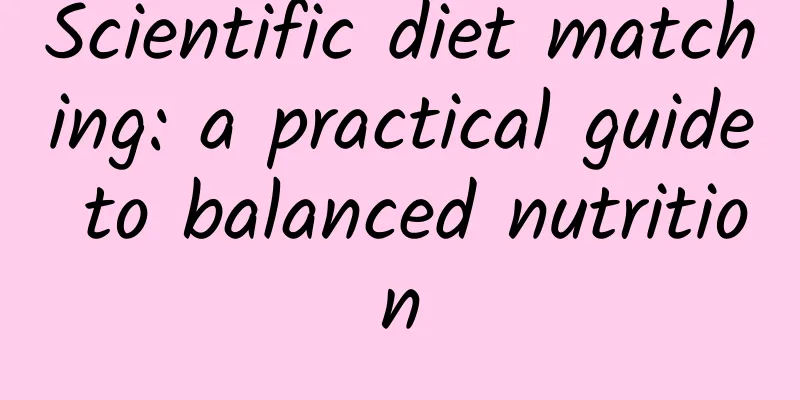Scientific diet matching: a practical guide to balanced nutrition

|
(Full text is about 2080 words, reading time is 6 minutes) Do you often feel sleepy after meals but can't find the reason? Do you have a hard time balancing fitness and fat loss with the enjoyment of delicious food? Behind these common problems, there is a core proposition - how to achieve scientific and accurate dietary nutrition matching. This article will help you systematically grasp the underlying logic and practical strategies of nutrition matching. 1. Decoding of Nutritional Elements Six essential nutrients form the cornerstone of human metabolism: 1. Macronutrients - Carbohydrates (4kcal/g): The only energy source for the brain, low GI foods (oats, quinoa) are preferred - Protein (4kcal/g): Raw material for tissue repair, animal protein (egg PDCAAS=1.0) and plant protein complement each other - Fat (9kcal/g): carrier of essential fatty acids, recommended ratio of Ω-3:Ω-6 is 1:4 2. Micronutrients - Vitamins: Water-soluble vitamins (B, C) need to be supplemented daily, and fat-soluble vitamins (A, D, E, K) should be aware of the risk of accumulation - Minerals: Balance of calcium-phosphorus ratio (1:1.5), sodium-potassium ratio (1:3) 3. Functional ingredients - Dietary fiber: soluble (pectin) and insoluble (cellulose) work together - Phytochemicals: antioxidant network of polyphenols and carotenoids 2. Four-dimensional rule of matching 1. Diversity Matrix - 12 daily/25 weekly food coverage, using the rainbow diet (red, orange, yellow, green, purple, white, black) 2. Energy density control - Calculate basal metabolism according to the Harris-Benedict formula and adjust the activity coefficient by grade (1.2-1.9) 3. Nutrient synergy - Iron and VC improve absorption rate (spinach with bell peppers) - Vitamin D fortification of calcium utilization (milk sunshine) 4. Chrono-nutrition - The energy supply ratio of breakfast is ≥25%, and the protein ratio of dinner is increased to 35% to help with nighttime repair 3. All-weather solution 7:00 Breakfast (500 kcal) - Whole wheat sandwich (whole wheat bread 80g, fried egg and avocado 30g) - Greek yogurt 150g blueberries 50g Energy supply ratio: Carbohydrate 45% | Protein 25% | Fat 30% 12:00 Lunch (650kcal) - 150g multi-grain rice (brown rice: black rice = 3:1) - Steamed sea bass 200g, garlic broccoli 200g - Tofu miso soup (50g northern tofu) Trace elements: selenium vitamin E antioxidant combination 15:30 Snack (200 kcal) - 25g mixed nuts (almonds, walnuts, Brazil nuts) - Kiwi fruit 100g (vitamin C 62mg) 18:30 Dinner (550kcal) - 100g soba noodles 120g chicken breast - Cold okra 150g, purple cabbage 100g - Natto 50g (containing vitamin K2) Total dietary fiber 25g (Data support: Dietary Guidelines for Chinese Residents) 【Conclusion】Precise nutritional matching is the first line of defense in preventing chronic diseases. According to WHO data, a healthy diet can reduce the risk of cardiovascular disease by 35% and the incidence of diabetes by 40%. Let us start from the next meal, use knowledge to reconstruct the dietary structure, and make nutrition a sustainable driving force for health. |
>>: Can myopia surgery be performed on the same day as the examination?
Recommend
#千万IP创科普# Autumn mosquitoes are fiercer than tigers, beware of Japanese encephalitis! Get the preventive measures~
It is said that "autumn mosquitoes are fierc...
How big is the follicle usually when it is released?
As a woman, it is best to have a certain understa...
Why do I keep farting after an abortion?
Farting is a very normal phenomenon in daily life...
Will the fetus enter the pelvis if it is in an abnormal position? Pregnant mothers must watch
Malposition of the fetus is a common phenomenon. ...
Can vulvar leukoplakia be cured?
Women really cannot ignore the itching of their v...
Can vaginal ultrasound detect pregnancy?
I don't know if you have ever done a vaginal ...
Female right buttock pain
In daily life, some women may experience pain on ...
Is it normal to have back pain during menstruation?
Low back pain can be said to be one of the most c...
Pelvic fluid 5 cm
Patients with pelvic effusion should note that th...
Will drinking soy milk often cause breast cancer? Women should stay away from these 5 things to protect their breasts
"Drinking soy milk can cause breast hyperpla...
Cervical smear test and treatment
The cervical problem is undoubtedly a major focus...
What will happen if you have sex during the first three months of pregnancy?
Many people know that sexual intercourse is not a...
What are the female contraceptive methods?
There are many ways of contraception. Girls nowad...
Pay attention to this word on the CT report! It is likely to be cancer, don't take it lightly!
Nowadays, everyone pays more attention to physica...
What to do if vulvar acne is painful
I always feel that my vulva is uncomfortable and ...









